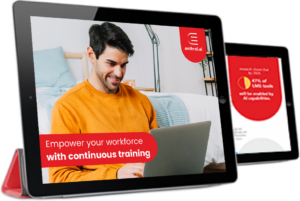A Complete Guide
5 Benefits of Using LMS for Employee Training
The benefits of an LMS go beyond just making management of e-learning courses a breeze. If you pick the right LMS and combine it with a solid L&D strategy, you have a winning combo. This does not just level up your employee training game, it also has rippling effects on your whole organization.
While it may initially appear as an expense, investing in an LMS for employee training can yield substantial returns in the long run. Studies show that businesses leveraging employee training solutions experience a remarkable 218% increase in income per employee, coupled with a notable 24% boost in profit margins!
We look at some benefits of using the right LMS for employee training:
1. Improved Learning Accessibility
Rolling out a cloud-based, mobile-friendly LMS ensures that training modules are at the fingertips of employees, no matter where they are. This setup is a game-changer for everyone, including remote workers and those in a global workforce, giving them easy access to training materials. Plus, it is a win for employees who are keen on boosting their knowledge during commutes or lunch breaks.
LMS also provides the freedom to tailor training paths according to the unique needs of each learner/employee. This feature opens the door to delivering personalized learning experiences on a broader scale. For example, in a product training session designed for customer service people, an initial assessment gauging their understanding of product features can be carried out. Later on, learners can dive into additional modules crafted to address their specific areas of improvement.
2. Increased Employee Satisfaction & Retention
An LMS is a key tool to bolster L&D initiatives, making it an attractive solution for top talent retention. As the job market sees a rise in employee mobility, with almost 1 in 4 workers contemplating job changes, companies face significant costs—both in lost productivity and replacement expenses, totalling around $600 billion annually.
Often, the primary driver for employees switching jobs is the pursuit of more career development opportunities. Harnessing an LMS empowers companies to build comprehensive employee training programs. With personalized learning paths, employees can seamlessly upskill and advance their careers, creating a win-win
3. Cost and Time Efficiency
Digitizing employee training brings much more cost savings compared to traditional classroom-style training.
The shift not only cuts expenses related to printing materials and instructor fees but also streamlines in-person training, saving valuable time. Moreover, the allure of in-person, instructor-led training courses is on the decline, influenced in part by global events such as the COVID-19 pandemic and also by the substantial costs and logistical challenges tied to organizing such courses.
Developing in-person training involves finding an instructor, securing a venue, coordinating schedules and more. In contrast, online employee training with an LMS requires assembly only once and can be utilized repeatedly for both current and future employees.
4. Improved Onboarding Experience
Onboarding is the singular chance to make a stellar first impression and initiate the employer-employee relationship positively. Employees who undergo comprehensive, structured onboarding are 58% more likely to remain with the same organization three years down the line. In contrast, a poor onboarding experience has led 10% of employees to exit a company.
Leveraging an LMS to streamline your employee onboarding procedure can ensure a more content and well-prepared workforce. An LMS helps offer a standardized and consistent onboarding journey. Through the LMS, you can craft courses that provide new employees with all necessary information to swiftly and effectively assimilate into their roles. By using an LMS for onboarding, either independently or in tandem with other methods, you can cultivate a more organized first week of work.

Empower your workforce with continuous training
- Employee Onboarding
- Employee Upskilling
- Compliance Training
5. Enhanced Employee Performance
An LMS empowers employees by granting them access to learning materials and courses, enhancing their productivity. With quick access to information, employees can efficiently tackle tasks and projects while easily locating resources to stay ahead in their job responsibilities.
Additionally, an LMS offers a platform for employees to review and retain information. A continuous learning platform ensures that employees not only acquire information but also apply it to their job duties.
Organizations are sometimes apprehensive about investing in an LMS primarily due to associated costs. While LMSs span various price points, selecting one with features aligned to your L&D goals is key.
Despite the initial investment of time and capital, an LMS can yield substantial long-term savings, potentially reaching thousands or even millions of dollars. In the shift towards a collaborative and interconnected future of work, establishing robust online training programs with an LMS is important for a dynamic and agile organization.







